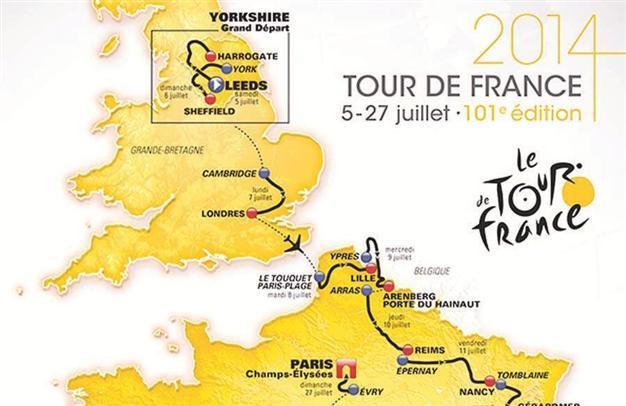Tour de France unveils challenging 2014 route
PARIS - Agence France-Presse

Starting in Leeds, England, on July 5, the 101st Tour ends 22 days later on the Champs-Elysees in Paris. AP Photo
The Tour de France will pass through the scene of some of the worst fighting of World War One next year, organizers revealed yesterday, as they unveiled a route likely to challenge champion Chris Froome.
One hundred years after the start of the Great War, cycling’s most famous race will pay tribute to the millions killed in one of history’s bloodiest conflicts, visiting towns and countryside devastated by four years of fighting.
Stage five starts in Ypres, in the Flanders region of western Belgium, which was the scene of sustained and intensive fighting between German and Allied forces.
Stages six and seven visit Arras, the Chemin des Dames, Verdun and Douaumont -- all sites of key battles and home to memorials to the fallen -- and a finish in Reims, in Champagne country, where French kings were once crowned.
The cycling tribute comes amid commemorations across France, Europe and the rest of the world to the conflict that helped shape the violent history of the 20th century. The 101st edition of the Tour de France overall includes six mountain stages with five summit finishes and a stage tackling the cobblestones that are the hallmark of the Paris-Roubaix classic.
There is also just one time-trial for the first time since the 1950s, all of which will provide defending champion Chris Froome with a tough test in a race likely to favour climbers.
Kenya-born Briton Froome, who rides for Team Sky, revealed recently that he was not looking forward to reports of a cobbled stage and was hoping for a maximum amount of time-trials to favour him over more adept, smaller, lighter climbers.
Froome retained the title for Britain in the Tour’s 100th edition last year after compatriot Bradley Wiggins became the country’s first-ever winner in 2012.
British cycling fans will be hoping for a third, straight win for the nation, particularly as the race starts on July 5 in the northern English city of Leeds and includes two opening stages in the county of Yorkshire.
The peloton will head to mainland Europe on July 8 after a third stage from the historic university city of Cambridge in eastern England with a finish outside Queen Elizabeth II’s London residence Buckingham Palace.
Froome’s potential challengers next year are likely to be 2013 King of the Mountains Nairo Quintana, Giro D’Italia winner Vincenzo Nibali and two-time Tour champion Alberto Contador.
The penultimate stage, a 54-kilometre (33.5-mile) test against the clock between Bergerac and Perigueux in the southwestern Dordogne region, could provide Froome with his last chance to overhaul the climbers before they arrive in Paris. “Time-trials provide greater time gaps than the mountains, sometimes insurmountable ones,” explained Tour director Christian Prudhomme.
“Having the time-trial at the end is so the climbers don’t have to chase but can ride in front and not become demoralised.”
Froome and the rest of the peloton will get an early indication of the hard work ahead in the final 30km of the second stage from York to Sheffield, which organisers described as a “British version of Liege-Bastogne-Liege.”
Across the Channel, there will be little time to relax before the 156km fifth stage from Ypres to Arenberg Porte du Hainaut and more than 15km of cobblestones spread over nine different sections. Stage seven, from Epernay to Nancy, is the longest, covering a gruelling 233km.
The first summit finishes come in the Vosges region with the 161km stage eight from Tomblaine to Gerardmer and then the return of La Planche des Belles Filles at the end of stage 10.
It was there on the final 20km ramp that Froome earnt his first stage victory in 2012 and the 161km stage, with a final 5.9km climb averaging a punishing 8.5 percent gradient, could shake up the race and suit the likes of punchy finisher Joaquim Rodriguez. The first Alpine summit finish arrives on Stage 13 at Chamrousse at the end of 200km with an 18.2km climb averaging 7.3 percent. The high Alps beckon the following day with a 177km stage that crests the Cols du Lautaret and D’Izoard before finishing on the Risoul.
Stages 17 and 18 are relatively short at 125km and 145km but have Pyreneen summit finishes at Saint-Lary-Soulan and Hautacam.
The time-trial comes a day before the survivors roll onto the Champs Elysees in Paris on July 26.
